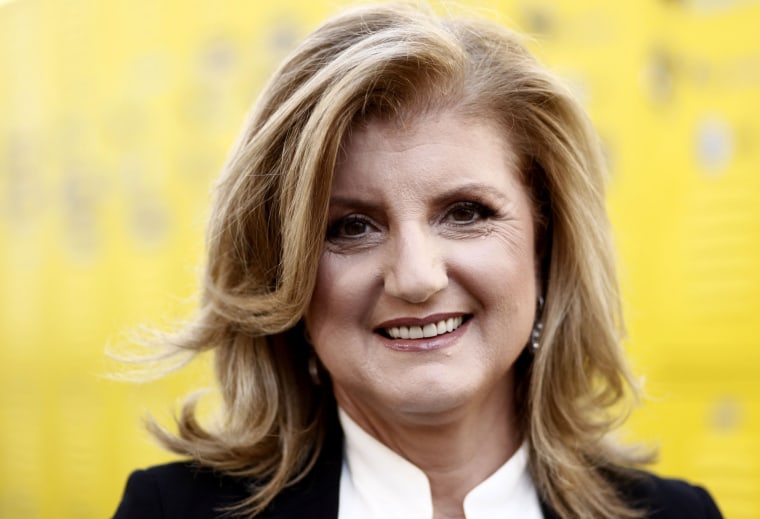Arianna Huffington: My father was a newspaperman. During World War II, when Germany occupied Greece, he was publishing an underground newspaper. He was caught and sent to a concentration camp, where he spent the rest of the war. Afterward, he recovered at a sanitarium in Greece, where he met my mother, who was recovering from TB. I was conceived before they were married.
My mom was the biggest influence in my life. One day, I looked in a magazine and saw a picture of Cambridge University, and I said I wanted to go there. Everybody else laughed. But my mother said, "OK; let's find out how you can go there." She borrowed money for us to go to England. She made it clear if I failed — if I didn't get into Cambridge — it was not a big deal. But I got in.
At Cambridge, I was passionate about debating. I was never to the far right. One of the debates I participated in was with John Kenneth Galbraith and William F. Buckley on the role of government and the markets. I was chosen to make the opening speech, arguing against an unregulated free market. On social issues, I was always pro-choice, pro-gay rights, pro-gun control.
I moved to New York from London in 1980. In 1986, I married Michael Huffington and moved to Washington. I wrote a biography of Picasso and a book on the human instinct for meaning. In the '90s, I wrote a syndicated column and co-hosted Left, Right & Center on public radio.
My journey politically has always been about the role of government. My transformation had to do with my conclusion that in order to have a level playing field, we did need an activist government. That was the shift. It was a very specific transformation and happened after [Newt] Gingrich and the '94 Republican government.
In 1997, I got divorced and moved to Los Angeles. My marriage gave me the two most important things in my life — my daughters. The end of the marriage was painful, but now Michael and I are able to be friends and even take vacations together with our children.
I ran for governor of California in 2003. The campaign was a failure, but I learned about the power of the Internet. Most of our money for the campaign, almost $1 million, was raised online.
After the '04 presidential race, I had a meeting to discuss the role media had played in the election. Among those at the meeting was Ken Lerer, who became my co-founder. We discussed creating a platform that would be a combination of 24/7 news and a collective blog. That was the beginning of the Huffington Post.
We agreed that we would each raise half the total needed to launch the site. I ended up raising my half from friends in a week. A year and a half later, we took in venture capital from SoftBank Capital, whose managing partner at the time, Eric Hippeau, is now our CEO.
The site launched in May 2005. Arthur Schlesinger Jr. was the first person I invited to blog. He'd fax me his blogs. I remember criticism: "That's not blogging." But I felt it didn't matter how a blogger's thoughts got on to the site. In our first week, we had postings from Julia Louis-Dreyfus, Larry David, Gary Hart, John Cusack, and Walter Cronkite.
The most fascinating thing is the people who said no to blogging, then subsequently said yes. I remember Norman Mailer said, "I can't do it — I can't do anything until I finish my book." I said, "Fine, no problem." Three months later, there was this scandal of guards at Guantánamo flushing the Koran down the toilet. Norman calls me and says, "OK, I'll write about that. I'll e-mail you."
I get my knack for relationships from my mother. She was incapable of having an impersonal relationship with anybody. The delivery man would arrive at the house, and she'd say, "Sit down; have something to eat." As a result, I find it very easy to connect with people. And that's part of the Huffington Post. I'm bringing in voices — some well known, some not — and providing a platform.
Some people criticized us for not paying our bloggers, but we've always had professional editors running the site. And we now have almost 4,000 contributors, from politicians and entertainers to academics and leaders of nonprofits.
During the 2008 campaign, one of our citizen journalists, Mayhill Fowler, reported on Barack Obama's remarks at a San Francisco fundraiser. Obama said that Pennsylvania blue-collar voters "cling to guns or religion or antipathy to people who aren't like them." It derailed the campaign for a while and showed how much a citizen journalist could influence a national election.
There were reports we were going to sell, but that was false. We've raised another round of funding, giving the Huffington Post a valuation of over $100 million.
We call the Huffington Post a newspaper. I don't think that newspapers are dying. I think there will be fewer of them, but there will always be newspapers.
